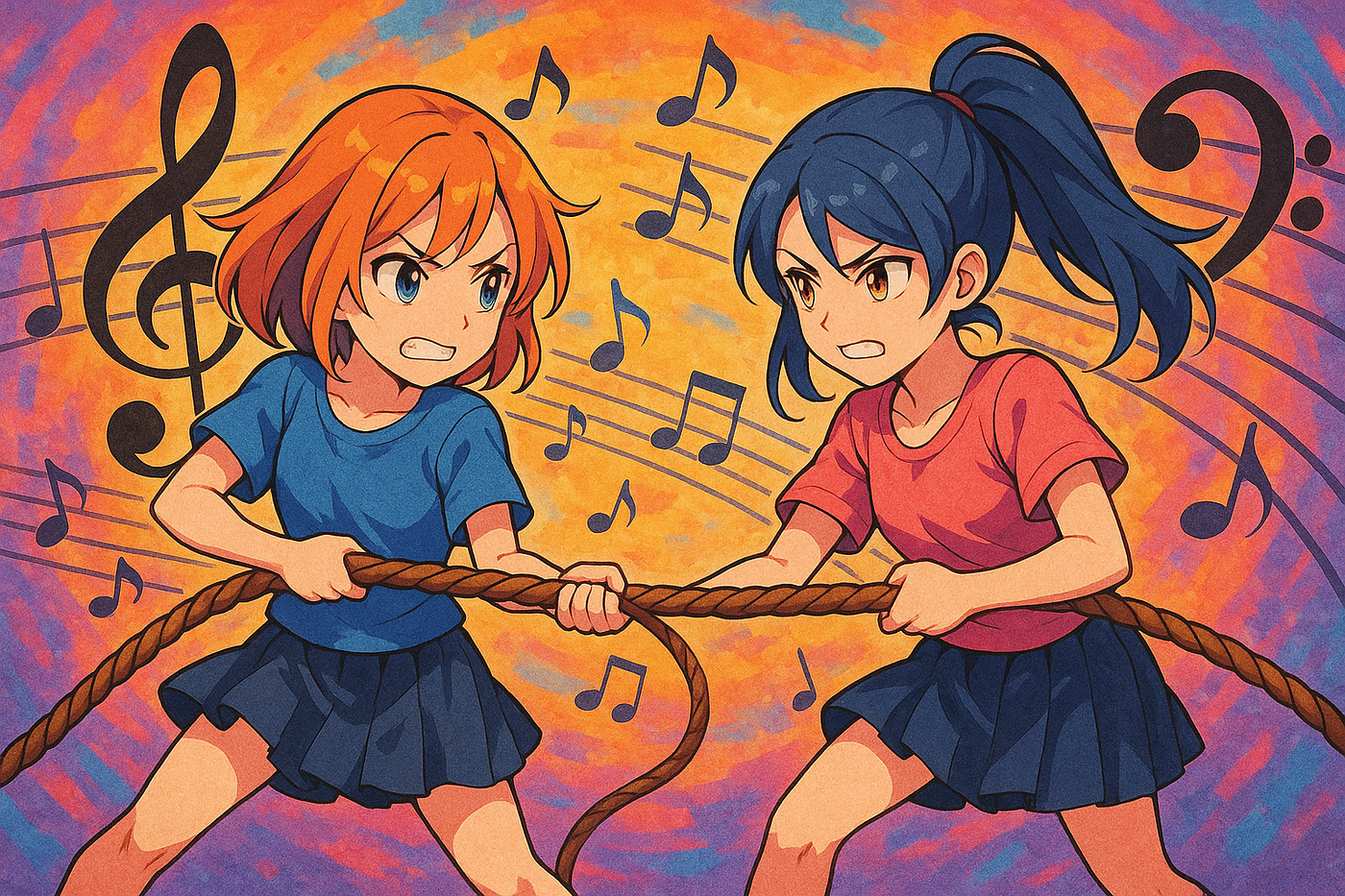Someone plays a note, then another and tells you the second is a perfect fifth higher. Maybe you hum "Twinkle Twinkle Little Star" to lock it in, and you've learned a perfect fifth. But what if you have perfect pitch? When you hear the first note, your brain instantly recognizes it as C, and the second as G. You just learned that G is a perfect fifth higher than C. You can also sing C to G, and call it a perfect fifth, but you haven't learned the interval.

Any person who has learned intervals can sing a perfect fifth, given an A, intuitively. To do it using only perfect pitch, however, you need to first determine that the perfect fifth of A is E. Memorizing intervals logically like this isn't usually very difficult, and people do it all the time. Here's where it gets tricky: what if the first note is an A that's 30 cents flatter than your internal A? If you've been leaning on perfect pitch instead of learning intervals, you're in trouble. That off-pitch A doesn't neatly snap to "A" and estimating how far the off-pitch A is from the A you know is tough because you haven't been practicing intervals. If that weren't bad enough, after you've determined that the perfect fifth of A is E, you'll be approximating the offset in reverse hoping to land close to the right spot. No wonder people with perfect pitch grumble about transposing and things being out of tune.
If you have perfect pitch, you recognize an F♯ as an F♯, or any other note, without needing a reference. Relative pitch, on the other hand, is about gauging distances between notes. Though there's lots of overlap, these are distinct skills for interpreting pitch. Most of us have some sense of relative pitch and musicians often develop the ability to do it intuitively. Even with a basic grasp of relative pitch we can usually sing or play a tune in any key, even slightly off-key, once we have the starting note. How does something so simple for the rest of us suddenly become that difficult just because someone has perfect pitch?
Relative Pitch Trying to Relate to Perfect Pitch
People with a strong sense of relative pitch are used to navigating music through relationships. Hearing a C and jumping to E is just connecting the dots, even when you simply recognize it as a major third. Naming a C out of thin air is counterintuitive because your brain expects an anchor. Ignoring that instinct and focusing on hearing a note's unique chroma can feel like unlearning how to breathe, especially when compared to the simplicity of relative pitch. You probably don't even realize that you've only ever consciously compared pitches to other pitches by pitch height.
Perfect Pitch Struggles with Relative Pitch
As a learner with perfect pitch, you hear a note and instantly sense its unique qualities, like a distinct color in your ear. When you hear two notes, you notice each one's pitch independently of one another. Unfortunately for you, music education assumes people will hear the interval between notes, the relative pitch, and not the absolute pitches. For a while, nobody will even notice that you're not learning relative pitch because your perfect pitch works just fine for simple relative pitch tasks. For those with perfect pitch, the way relative pitch is taught makes it a logical exercise, which can get frustrating quickly as the tasks get more complicated.
This seems to be the root of why some people who struggle with certain musical tasks point to perfect pitch as the culprit. Many people with perfect pitch fret about struggles related to transposing or dealing with off-pitch notes. Some people even claim perfect pitch is simply a curse that causes problems. These headaches are real, but usually stem from other things, like perfect pitch and relative pitch being out of balance. If you've got a strong sense of relative pitch, which most musicians do, mixing in perfect pitch won't suddenly deprive you of your ability to recognize or reproduce intervals. Here are some common complaints:
I can't transpose music
You're playing a tune in C major, and someone says, "Let's do it in D." Someone with perfect pitch might be locked onto each note's name: C, G, E. Shifting to D means renaming them to D, A, F♯, and that note-by-note slog, apart from demanding logical effort, distracts from the musical experience. For a vocalist with relative pitch who can just start on another note or a guitarist who can just shift up the fretboard, transposing might not even be required at all. Do people without perfect pitch remember songs by memorizing interval names? No, yet they are navigating melodies using relative pitch. This problem has more to do with how you've learned to remember melodies than anything else.
Like many things, transposing is very difficult when you haven't learned to do it properly, and that has nothing to do with perfect pitch. There are countless musicians who can transpose music in realtime and for most instruments that involves different fingering patterns, instrument mechanics, range limitations, and a slew other things. To transpose in realtime you must internalize the skills required to do that on your instrument. If you learned to interpret melodies using only perfect pitch, learning to navigate melodies by context is just another skill on the list of requirements, even if your instrument is your voice.
I can't play guitar with a capo
Strum an open C chord voicing with a capo on the second fret, and let it ring out. Someone with perfect pitch might be uncomfortable when they hear D even though it looks and feels like C, or they might be okay with D but be thrown off if the guitar were instead tuned to D standard. The same thing can happen if you switch from your B♭ tenor saxophone to your E♭ alto or hit the transpose button on your electric piano. Guitars ironically provide the perfect illustration to debunk this problem as they are regularly tuned myriad ways like drop D, open G, or E♭ standard, and a capo just shifts everything up the neck. A dependence on the shape or position on the fretboard is a learned habit, and not a flaw of perfect pitch. Learning to hear a chord's role, not just its name, via relative pitch lets you adapt easily to any tuning or capo position.
I can't stand songs that are in the "wrong" key
Say you learned "Happy Birthday" in F, and someone belts it out in G. Are they singing it in the wrong key? What if that other person also has perfect pitch, but remembers the song in G? Who's right? What about songs that modulate during the song, is only half the song wrong? This problem generally is a consequence of over-indexing on some remembered idea of "correct". The same song in a different key can invoke different emotions and certainly, if you remember it by the note names, can seem like a different song altogether.
Even professional artists play their own songs in different keys all the time, maybe to suit a vocalist's range or because the guitars on stage are tuned down or up. Are they wrong when they play their own songs in different keys than the one you remember? This is just another product of how we learned to remember the music. Adding a strong sense of relative pitch would help you hear the song's shape, not just its individual notes, so any key could feel right.
The Perfect Pitch Problem Is a Myth
Struggles with transposing or hating songs played in different keys are often blamed on perfect pitch. This myth of attribution originates from relative pitch being neglected, usually because your ear's already wired for absolute notes. It's so easy, automatic even, to use perfect pitch instead of relative pitch that learning relative pitch could end up being considerably more work. Thankfully, this is a solved problem, and people with perfect pitch regularly develop relative pitch to super advanced levels. How else could Michael Jackson, Mozart, and Stevie Wonder have become such musical legends if perfect pitch were holding them back?

Flip it around, and this is another big reason perfect pitch can be difficult to learn once our brains want intervals, and not note names. Both skills are hard to learn when one's already advanced, but neither's impossible. HarmoniQ was built in part, to make perfect pitch easier to learn for people with a strong sense of relative pitch. Relative pitch is not optional if you want to advance as a musician, and perfect pitch isn't the superpower some expect it to be. There doesn't have to be a tug-of-war and you can get the best of both worlds by developing them until both are intuitive. HarmoniQ is here to help you add perfect pitch to your mix.